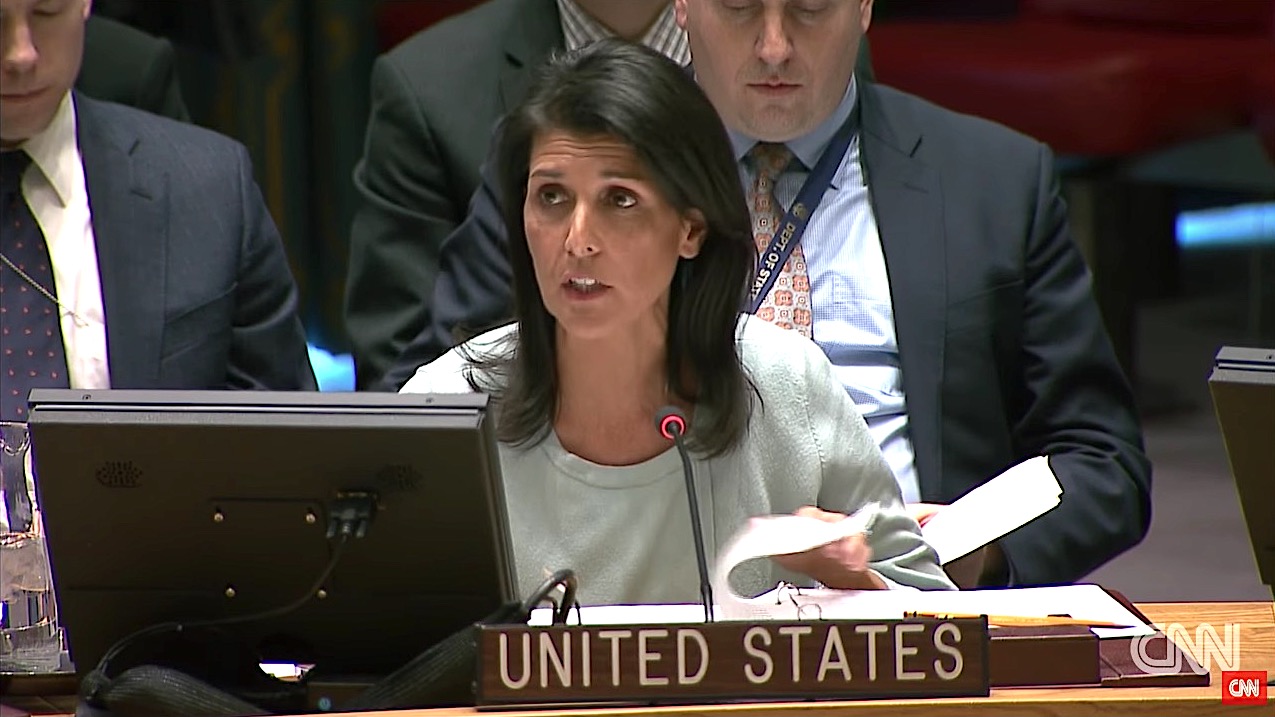Trump's U.N. ambassador blasts Russia, says Crimea-focused sanctions will stay in place


A free daily email with the biggest news stories of the day – and the best features from TheWeek.com
You are now subscribed
Your newsletter sign-up was successful
On Thursday, in her first remarks to the United Nations Security Council, U.S. Ambassador Nikki Haley issued the Trump administration's first condemnation of Russia's actions in Ukraine, including its seizure of the Crimean peninsula in 2014. "I consider it unfortunate on the occasion of my first appearance here I must condemn the aggressive actions of Russia," she said. "We do want to better our relations with Russia. However, the dire situation in eastern Ukraine is one that demands clear and strong condemnation of Russian actions."
Because of President Trump's praise of and refusal to criticize Russian President Vladimir Putin, there has been the expectation that he might lift U.S. sanctions against Russia and some Russian officials. Haley suggested otherwise, at least the 2014 sanctions over Ukraine. "Eastern Ukraine of course is not the only part of the country suffering because of Russia's aggressive actions," she said. "The United States continues to condemn and call for an immediate end to the Russian occupation of Crimea." Since Trump's phone call with Putin, pro-Russia separatists have launched ongoing attacks in eastern Ukraine.
Haley's remarks, while out of step with Trump's, are in line with what she and other Trump nominees — notably Secretary of State Rex Tillerson and Defense Secretary James Mattis — said in their confirmation hearings. Western allies are not sure where that leaves them on crucial issues like NATO, though The New York Times suggests that Haley's speech, combined with the White House asking for a halt in Israeli settlements and threatened sanctions on Iran, signals that Trump "is embracing some key pillars of the former administration's strategy."
The Week
Escape your echo chamber. Get the facts behind the news, plus analysis from multiple perspectives.

Sign up for The Week's Free Newsletters
From our morning news briefing to a weekly Good News Newsletter, get the best of The Week delivered directly to your inbox.
From our morning news briefing to a weekly Good News Newsletter, get the best of The Week delivered directly to your inbox.
At the same time, on Thursday the Treasury Department eased sanctions against Russian spy agency FSB that Obama had put in place to hit back against Russia's interference in the 2016 election. A Treasury official described it as "a very technical fix" to help consumer technology companies export products into Russia. FSB issues import licenses for tech products, and the fix, in the works since Jan. 20, will allow them to request those documents. Trump said Thursday that he's "not easing anything," but even supporters of the shift said the timing is lousy. "It's probably not a huge deal, but it is tone deaf," a Republican aide who is hawkish on Russia told The Wall Street Journal.
A free daily email with the biggest news stories of the day – and the best features from TheWeek.com
Peter has worked as a news and culture writer and editor at The Week since the site's launch in 2008. He covers politics, world affairs, religion and cultural currents. His journalism career began as a copy editor at a financial newswire and has included editorial positions at The New York Times Magazine, Facts on File, and Oregon State University.
-
 5 blacked out cartoons about the Epstein file redactions
5 blacked out cartoons about the Epstein file redactionsCartoons Artists take on hidden identities, a censored presidential seal, and more
-
 How Democrats are turning DOJ lemons into partisan lemonade
How Democrats are turning DOJ lemons into partisan lemonadeTODAY’S BIG QUESTION As the Trump administration continues to try — and fail — at indicting its political enemies, Democratic lawmakers have begun seizing the moment for themselves
-
 ICE’s new targets post-Minnesota retreat
ICE’s new targets post-Minnesota retreatIn the Spotlight Several cities are reportedly on ICE’s list for immigration crackdowns
-
 TikTok secures deal to remain in US
TikTok secures deal to remain in USSpeed Read ByteDance will form a US version of the popular video-sharing platform
-
 Unemployment rate ticks up amid fall job losses
Unemployment rate ticks up amid fall job lossesSpeed Read Data released by the Commerce Department indicates ‘one of the weakest American labor markets in years’
-
 US mints final penny after 232-year run
US mints final penny after 232-year runSpeed Read Production of the one-cent coin has ended
-
 Warner Bros. explores sale amid Paramount bids
Warner Bros. explores sale amid Paramount bidsSpeed Read The media giant, home to HBO and DC Studios, has received interest from multiple buying parties
-
 Gold tops $4K per ounce, signaling financial unease
Gold tops $4K per ounce, signaling financial uneaseSpeed Read Investors are worried about President Donald Trump’s trade war
-
 Electronic Arts to go private in record $55B deal
Electronic Arts to go private in record $55B dealspeed read The video game giant is behind ‘The Sims’ and ‘Madden NFL’
-
 New York court tosses Trump's $500M fraud fine
New York court tosses Trump's $500M fraud fineSpeed Read A divided appeals court threw out a hefty penalty against President Trump for fraudulently inflating his wealth
-
 Trump said to seek government stake in Intel
Trump said to seek government stake in IntelSpeed Read The president and Intel CEO Lip-Bu Tan reportedly discussed the proposal at a recent meeting
